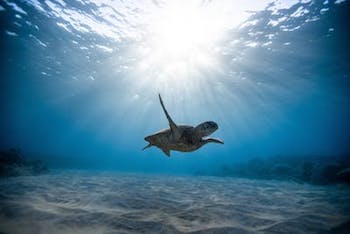The time to act to protect our beautiful planet is now.
Photo by Jeremy Bishop
As you may have seen, we the citizens of almost every nation on Earth have recently become party to a global-level agreement that will confer on us some pretty ambitious targets and obligations over the next few years. The goals are challenging, even daunting, and the time we’ve given ourselves is short. Meeting them won’t be easy.
So what have we agreed to, and why does it matter?
Some of the key ones are these:
1. Reduce harmful government subsidies by $500 billion annually. To take an example, fishing subsidies alone are estimated at over $35 billion per year, with at least $20 billion of that directly contributing to over-fishing. In this area, as in many, many others, we need to drastically curtail this foolish and dangerous behavior.
2. With somewhere between 6 – 8% of our greenhouse gas emissions coming from the production of food that never gets eaten, we’ve agreed to take steps to cut food waste in half. To add to the urgency of this, when organic waste ends up in landfills and decomposes, it produces methane, an especially potent greenhouse gas.
3. Protect 30% of Earth’s lands, oceans, coastal areas, and inland waters. Currently only 15.7 percent of land and freshwater, and 8.1 percent of oceans are protected. These places are part of a network of 270,000 protected and conserved areas around the world, but we need to dramatically extend them.
And all of this by 2030. Oddly enough, that actually sounds like it’s a way off in the future, but we’re really talking about only 7 years!
So who are these folks and why are they making life-changing decisions for the rest of us? Well, let me start by saying that we need to pay attention and to take this very seriously. The agreement adopted will be known as the Kunming-Montreal Global Biodiversity Framework (GBF). COP15 was convened by the UN, chaired by China, and hosted by Canada (Kunming is the capital city of China’s Yunnan province, Montreal the site of this conference). COP is simply reference to ‘conference of parties’, in this case the parties to the UN Convention on Biological Diversity. This was their 15th such conference, and this time around it culminated in this very significant deal. That, in a nutshell, is the background.
So what comes next?
First, each of the 190 signatory countries needs to act with urgency to formalize these targets by putting them into legislation. Second, to build in metrics so that the citizens of those countries can know how they’re doing in meeting those targets. Third, establish mechanisms for accountability. This last one is really important.
If we do these things, there’s a much improved chance that our commitments will translate into meaningful action on tackling climate change and reversing the loss of our biodiversity. I might also note that in the case of countries like Canada, we’d do well to work closely with indigenous leaders as we build this legal framework. As we redefine our relationship to the natural world, it certainly makes sense to draw on that huge store of knowledge that’s been acquired over thousands of years. We’re lucky to have access to it, and should take full advantage of it.
What has been agreed to at COP15 is the minimum we have to do if we’re to have a collective future. We must meet our commitments and get this done. Otherwise, by 2030 our window of opportunity will have closed. I expect that you’re also concerned that even if your home country gets onboard, then what about the rest of the world? I can only say that we have to hope that enough countries meet the goals they’ve just agreed to that the right precedent gets set. If enough of us choose to lead by example our 21st century civilization can establish much-needed momentum. We want to be on the right side of this. Future generations are counting on us.
For The Orca’s Voice,
Jason, Canadian Cetacean Alliance



Leave a Reply